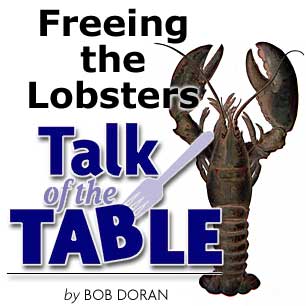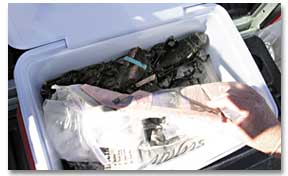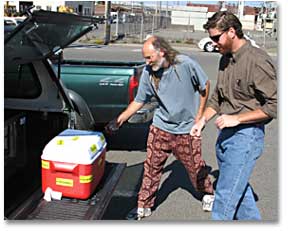|

COVER STORY | IN THE NEWS | DIRT | ARTBEAT
TALK OF THE TABLE | THE HUM | CALENDAR
October 19, 2006

The last minute e-mail
alert from KHUM deejay Mike Dronkers got straight to the point,
"So, yeah, I'm a vegetarian and think this is `newsworthy'
or something. Anyway, this kinda shy guy Douglas Tabler is on
his way to the Eureka FedEx office to ship these lobsters home
to Maine. He read a Letter to the Editor in the [Times-Standard]
about the inhumane Eureka Co-op lobster tanks and has taken matters
into his own hands."
 With
just 15 minutes before zero hour, I jumped in my car and turned
on the radio. By the time I hit Eureka, Dronkers was on the phone
with Pete Nichols of Humboldt Baykeepers, a somewhat reluctant
assistant in the lobster liberation action. He turned his cell
over to Tabler, who explained how he'd become a one-man lobster
liberation front. With
just 15 minutes before zero hour, I jumped in my car and turned
on the radio. By the time I hit Eureka, Dronkers was on the phone
with Pete Nichols of Humboldt Baykeepers, a somewhat reluctant
assistant in the lobster liberation action. He turned his cell
over to Tabler, who explained how he'd become a one-man lobster
liberation front.
Right: Live lobsters packed for shipping to
Maine and freedom. Photo by Bob Doran.
Upset when he saw the live lobster tank in the
new Co-op's meat department, Tabler initially made a protest
sign and picketed the store. Then, last Wednesday, inspired by
the story of a little girl who won a lobster then had it returned
to the sea, he'd made a spontaneous decision to buy all the lobsters
in the store.
The little girl he'd heard about was Myranda Hutchinson,
a 7-year-old in Cincinnati who won an eight-pound lobster known
as Bubba in a supermarket raffle. Since Myranda did not want
to eat Bubba, her folks sought a home for him at various zoos
and aquariums, to no avail. As one zoo curator reportedly put
it, "lobsters are a dime a dozen." Instead of moving
from one tank to another, Bubba was ultimately shipped by plane
to Bar Harbor, Maine (fare $280) where Eddie "Diver Ed"
Monat, captain of a tour boat, dropped him back into the sea.
Like Myranda, Tabler did not have a solid plan
when he purchased the last four lobsters in the Co-op tank. Of
course they were not a dime a dozen; they cost $14.95 a pound.
It would have amounted to around $80 for the quartet of crustaceans,
but for the fact that he bought them on Co-op Member Appreciation
Day, and received 10 percent off.
Tabler noted that the Co-op employees were, "really
helpful" and suggested that "there's a lot of support
from the workers" for the anti-lobster campaign since "they're
uncomfortable about selling live animals." (The folks in
the meat department were also cooperative, offering to order
him as many lobsters as he'd like.) Dronkers the deejay had incorrectly
guessed at a connection with the letter to the editor from local
food activist (and Co-op member) Martha Devine. It was a Co-op
employee who showed it to Tabler. He has since contacted Devine
and they plan on picketing together.
Initially, Tabler bought a large fish tank, which
was in the back of his truck when he came to the Fed-Ex office
near Costco. Unsure of his ability to keep the animals alive
himself, he thought he might set them free off the coast locally.
That's where Nichols the Baykeeper came in. Tabler called him
asking for advice and he quickly convinced the liberator that
letting the Atlantic sea creatures go in the Pacific was not
a good idea.
 Instead,
Nichols suggested shipping them to Maine, where he has family.
By chance, Pete's brother (a Boston resident who prefers to remain
anonymous) was driving up to the old homeplace. He would receive
the shipment and set the lobsters free. As I mentioned above,
Nichols served as a somewhat reluctant facilitator for the operation,
in part because he grew up in lobster country where, he recalled,
"You could buy them for a dollar or two on the docks, or
people would just give them to you the way they do oversized
squashes out here." Instead,
Nichols suggested shipping them to Maine, where he has family.
By chance, Pete's brother (a Boston resident who prefers to remain
anonymous) was driving up to the old homeplace. He would receive
the shipment and set the lobsters free. As I mentioned above,
Nichols served as a somewhat reluctant facilitator for the operation,
in part because he grew up in lobster country where, he recalled,
"You could buy them for a dollar or two on the docks, or
people would just give them to you the way they do oversized
squashes out here."
Left: Douglas Tabler and Pete Nichols at FedEx
office. Photo by Bob Doran.
His work with Humboldt Baykeepers involves keeping
toxic substances out of local waters, both because the stuff
will harm sea life and because we don't want to eat contaminated
shellfish and crabs. At the organizations' website, www.humboldtbaykeeper.org,
you can download directions on the proper way to slaughter a
live crab to avoid harmful chemicals including dioxin, PCBs and
mercury. (In short, you don't boil them alive; instead you cut
them in half and clean out the gills first.)
Once Tabler finished his call to KHUM, he and Nichols
got to the business at hand, sealing the lobsters in a plastic
cooler in preparation for their cross-country flight. But first
he opened it to say goodbye. He'd kept the critters in his refrigerator
overnight, "to condition them for the trip," and packed
them with newspaper (copies of the Journal) and bags of
ice. He seemed especially concerned about the fact that their
claws were bound with rubber bands, which he noted, "must
debilitate you psychologically." He'd been tempted to take
them off, but did not since he'd heard the animals might attack
each other.
"I just hope they get back alive," he
said as he closed the cooler. Emerging from the Fed-Ex office
minutes later he seemed relieved that he'd done his part, but
also that shipping was less than he'd expected: "only $139."
What now? Would he be purchasing any more lobsters
to set them free? "No," he said, "but tomorrow
I'll be back at the Co-op with my sign," and he plans on
picketing until the store removes the tank.
It was soon clear that the radio interview was
making waves. A little while after leaving the Fed-Ex office
I found Co-op General Manager Len Mayer outside the new Eureka
store talking lobsters with muralist Duane Flatmo, who was preparing
to add some fine detail to the massive pastoral covering the
front of the store.
Mayer defended the live lobster tank, noting, "We've
sold live shellfish for some time with no one complaining --
things like clams, oysters and mussels."
Offering a tour of the new digs, he showed off
the cornucopia of fruits and vegetables arrayed in tall, decorative
stacks in the fashion of Whole Foods Market produce sections.
As we headed toward the Community Kitchen, where a free class
on salad dressings was in session, a woman stopped Mayer to say
she was relieved to hear that Co-op management had decided to
get rid of the lobster tank. No, he explained, that was not the
plan. As far as he was concerned the tank was staying -- steady
sales demonstrate that customers want live lobster.
As we moved on past new door-less coolers stocked
with juices and dairy products, including a fair share of organics,
he talked of the effort to offer a wide range of products, something
for everyone. He sees the lobster tank as part of that, and there
it was. Tabler had emptied the lobster tank the day before, but
it had been re-stocked. More than a dozen frisky lobsters crawled
about inside awaiting their fate.
The pros and cons of live lobsters proved to be
the talk of the town Friday night at Arts Arcata, where I ran
into letter-writer Martha Devine. Intent on fomenting dissent
among the Co-op membership, she's been reading up on lobsters
on the web, where People for the Ethical Treatment of Animals
(PETA) are encouraging "free the lobsters" campaigns,
along with their many other causes.
There's even an official Lobster Liberation Front
in the British Isles, where the tactics tend more toward sabotage
of lobster traps and fishing boats, but the locals are not allied
with them.
"It's all spontaneous, protesters like Doug
and me who are strong vegan activists," said Devine. "In
my opinion it's an egregious mistake for the Co-op to be doing
what they're doing. And we're not the only ones who feel that
way -- so many Co-op members have told us they agree with us."
She added, "The Co-op board of directors is
charged with the decision of whether to keep the tank or not,
and the annual Co-op membership meeting is coming up Wednesday,
Oct. 29, from 3-6 p.m. at the Eureka store. It's the one time
in the year when members can make public comment to the directors,
so people need to come and take a stand."
Devine points to a precedent for getting rid of
lobster tanks: The Whole Foods Market chain announced in June
that they are discontinuing use of live lobster tanks. "We
are not yet sufficiently satisfied that the process of selling
live lobsters is in line with our commitment to humane treatment
and quality of life for animals," said Margaret Wittenberg
of Whole Foods in a press release.
"If Whole Foods can stop selling live lobsters
we can," said Devine. "Whole Foods is not a market
founded on co-op principles -- we are."
Devine has other complaints on her plate beside
lobsters. There's lingering resentment over the Co-op board's
decision to ignore a member's poll that went 2-1 in favor of
removing Coca Cola products from store shelves. She's also not
happy about the 20-year profit-sharing lease the Co-op signed
with the Arkleys when they took over the Eureka store.
"That's a done deal," she concedes, "but
they could get rid of the tank and at least throw us a bone --
to use a non-vegan metaphor. They say they'll lose business --
well, Whole Foods discontinued live lobster sales. Are they going
out of business? I don't think so."
A veteran of anti-war, anti-globalization and anti-GMO
protests, Devine is planning some street theater action for the
board meeting. A friend alerted her that Target is stocking a
lobster costume for Halloween. She wants one, but there's a small
hitch: "I'll have to have someone else buy it, since I refuse
to shop at Target."
As her friend pointed out, the costume is red,
which means the lobster has been boiled. No problem says Devine.
"I'll be a dead, red lobster returned from Hell -- ready
to haunt your ass."

your
Talk of the Table comments, recipes and ideas to Bob Doran.
COVER STORY | IN THE NEWS | DIRT | ARTBEAT
TALK OF THE TABLE | THE HUM | CALENDAR
Comments? Write a
letter!

© Copyright 2006, North Coast Journal,
Inc.
|